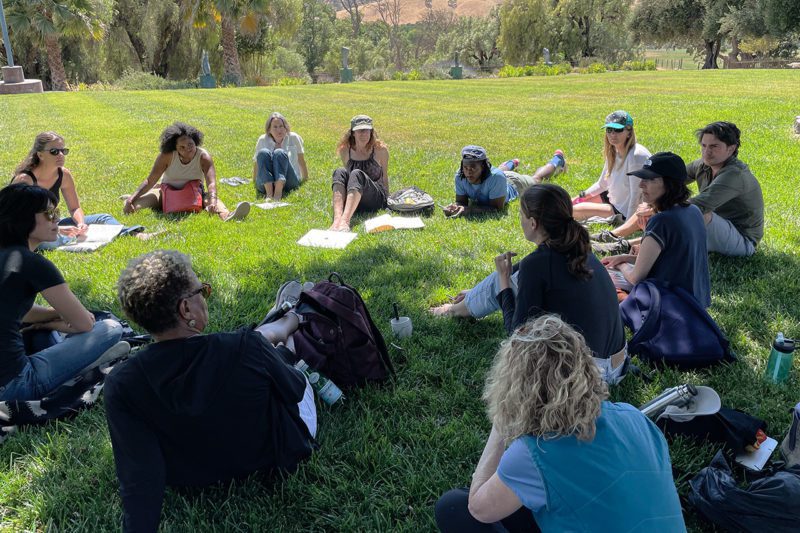Sovereign Seeds: Reclaiming MENA’s Agricultural Future
Reviving local food systems and unlocking rural prosperity

If you don’t feel great about the way you deal with money or how much you know about the intricacies of finance, you’re not alone. Our culture encourages excessive consumption, financial systems were designed to be complicated, and money myths are hard to escape.
Examining and challenging this status quo is critical to the work of the Just Economy Institute, where we educate and support a growing community of financial activists who are shifting the flow of capital and power to solve social and environmental problems. Here are five of the biggest money myths we see, along with introductions to a few of the activists who are debunking them:
1. “You shouldn’t talk about money.”
You’ve probably heard some version of “It’s not polite to talk about money,” or “You shouldn’t talk about money with friends.” Says who? The people who are just fine with dominant financial systems and the extractive economy, which drains human and natural capital from communities and leads to enormous wealth inequality. But if you’re interested in using your money to support a just and resilient economy, you’ll want to learn about ways to do it well, and it’s hard to learn about something if you can’t talk about it. Fortunately, there’s a growing movement of people who are talking about money and using those conversations to catalyze positive change.
Fortunately, there’s a growing movement of people who are talking about money and using those conversations to catalyze positive change.
Nwamaka Agbo and Lynne Hoey of Kataly Foundation speak openly about money and how they’re redefining and redistributing wealth. Their goal is to make sure Black and brown people have the resources, power, and agency to create shared prosperity within their communities. Two of the people they’re in conversation with are Jessica Norwood and Nina Robinson of RUNWAY, who are working to dismantle systemic financial barriers by providing low-interest loans and other forms of financial assistance to Black entrepreneurs. Nwamaka, Lynne, Jessica, and Nina forged a bond as JEI fellows and now share insights about moving money, making them more effective leaders and change makers.

2. “More money means more happiness.”
There are many beliefs tied up in the desire to accumulate more wealth, including the myth that having a lot of money will make us happy. The truth is that having enough resources to cover what we need to thrive is crucial but being rich doesn’t mean being happier. Having great wealth can in fact be very isolating. And there is evidence that people who prioritize maximizing wealth are less happy than those who prioritize relationships and experiences. In “Psychology and Consumer Culture,” psychologist Tim Kasser and psychotherapist Allen Kanner cite research finding that people with strong materialistic values tend to have lower levels of well-being.
Research finds that people with strong materialistic values tend to have lower levels of well-being.
Jennifer Hu Corriggio of Solidaire Network works with donors who support a collective approach to prospering. They move money to frontline communities working for racial, gender, and climate justice. In keeping with its Theory of Liberation strategy, the Solidaire community plans to move $1 billion to support social justice movements in ten years. And it’s not just altruism at work. Solidaire donors take a radical approach to philanthropy knowing that we will all benefit when everyone has enough to thrive.
3. “You shouldn’t just give people money.”
The story behind this myth is that “if you just give people money, they won’t spend it responsibly and they’ll become dependent (on you, your organization, or the government).” This leads to the creation of philanthropy and government programs that come with strings attached, as well as scrutiny and penalties if the recipient isn’t compliant. The reality is that true gift money can be catalytic and often leads to the best and most direct solutions.
True gift money can be catalytic and often leads to the best and most direct solutions.
Aisha Nyandoro of Magnolia Mother’s Trust has spent the past five years busting myths about the impact of giving money away. Her premise is simple: Poverty is not an individual failure; it is a policy failure. A minimum wage job doesn’t generate enough money to support a family. Navigating systems to get government support is difficult and dehumanizing. MMT provides $1,000 per month for 12 months to low-income Black mothers in Jackson, Miss. The program has been life-changing for the women and families receiving monthly payments. Now an expert on guaranteed income, Aisha is clear about the results: These programs help end the most devastating aspects of poverty, and it’s time for public policy to change.
4. “When it comes to financial decisions, leave it to the money experts.”
 We’re expected to trust Wall Street financiers and investment bankers to manage money well, despite the fact that their decisions drove the 2008 economic meltdown and continue to have destabilizing extractive effects. Most people are told, implicitly or overtly, “You don’t understand finance; leave it to the experts.”
We’re expected to trust Wall Street financiers and investment bankers to manage money well, despite the fact that their decisions drove the 2008 economic meltdown and continue to have destabilizing extractive effects. Most people are told, implicitly or overtly, “You don’t understand finance; leave it to the experts.”
Women and people of color in particular have been underestimated and excluded in financial circles. Financial firms owned by white men control 98.7% of the $69 trillion managed by the U.S. asset management industry (per a Knight Foundation analysis). The language, contracts, and structures of conventional asset managers are difficult to understand and designed to concentrate wealth and power. But it doesn’t have to be this way. We can learn from skilled leaders and new experts who are bringing transparency to financial systems and activating capital to create shared prosperity.
Tiffany Brown and Kate Poole of Chordata Capital, for instance, are unleashing the positive potential of capital. They’re financial advisors who believe the most important way for wealthy investors to transform our economy is by divesting from Wall Street and investing in community-controlled enterprises that build racial and economic justice. They educate and partner with a new generation of investors and help them realize their impact goals instead of patronizing them.
5. “Money will protect you.”
This myth is usually kept alive by financial gatekeepers or family members who believe that having a lot of money can protect us from life’s most serious challenges. Although money can cushion people from some difficulties, it can’t protect us from disease, loss, loneliness, burnout, or climate change. What can lead to greater well-being are good relationships, community, and a sense of purpose. And you won’t find those in any bank account.
Michael Johnson at NDN Collective, which works to create an ecosystem that empowers and centers Indigenous communities, is actively engaged in countering the belief that money is what will protect us. NDN takes a holistic approach that includes access to philanthropic resources and much-needed capital for Indigenous communities. But Johnson and his colleagues know that money is not enough to begin repairing the harms these communities have experienced. That’s why NDN supports Indigenous people working to defend their communities against extractive practices that endanger all people and the planet, contribute to climate change, and violate human rights in the name of profits. Their work is generating innovative ways to repatriate resources that respect Indigenous sovereignty while enacting solidarity economy principles, which put healing people and the planet first.

At Just Economy Institute immersions like this one–part of an intensive nine-month fellowship program– fellows have in-depth discussions on topics including restorative economics, catalytic capital, social justice philanthropy, and their own money myths. Photo Credit: Jilan Carroll Glorfield
JEI fellows are demonstrating that you don’t have to believe the myths you’ve been told about money, and you don’t have to be an expert on money to activate it for good. All you need is time, commitment, and a little help from your friends. A good place to learn more is MoneyTransforms.org. This site provides resources for harnessing the positive potential of capital—because anyone can be a financial activist.
Related Content
Comments
Deep Dives

Featuring
Clarisse Awamengwi
IE Correspondent
July 17 - 12:00 PM EST

Featuring
Russell McLeod
July 24 - 12:00 PM EST
RECENT
Editor's Picks
Webinars
News & Events
Subscribe to our newsletter to receive updates about new Magazine content and upcoming webinars, deep dives, and events.
Become a Premium Member to access the full library of webinars and deep dives, exclusive membership portal, member directory, message board, and curated live chats.
At Impact Entrepreneur, we champion fearless, independent journalism and education, spotlighting the inspiring changemakers building the Impact Economy. Diversity, equity, sustainability, and democracy face unprecedented threats from misinformation, powerful interests, and systemic inequities.
We believe a sustainable and equitable future is possible—but we can't achieve it without your help. Our independent voice depends entirely on support from changemakers like you.
Please step up today. Your donation—no matter the size—ensures we continue delivering impactful journalism and education that push boundaries and hold power accountable.
Join us in protecting what truly matters. It only takes a minute to make a real difference.
0 Comments